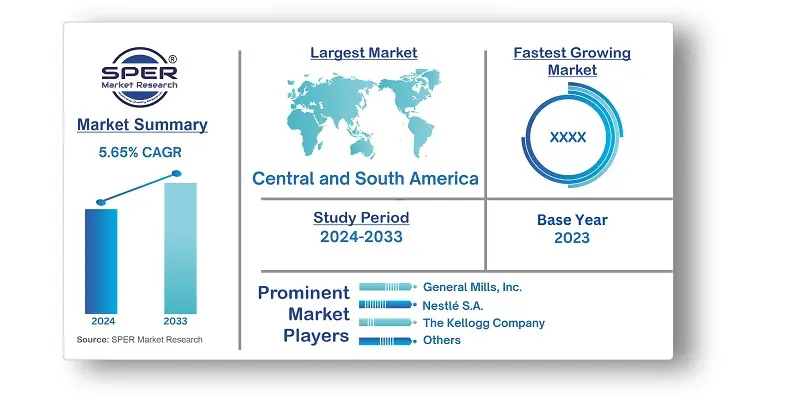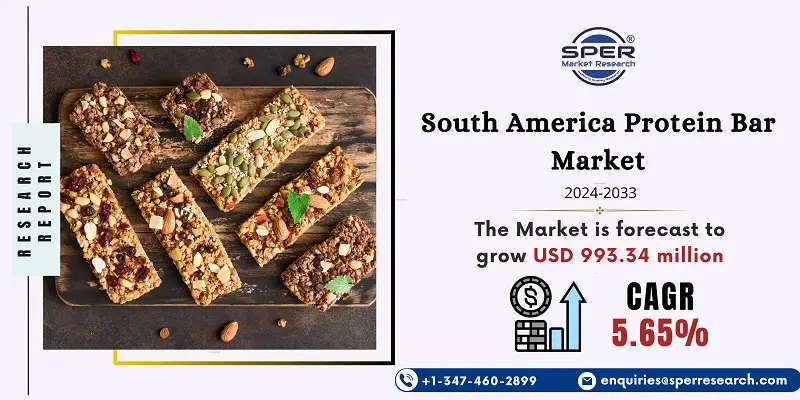
South America Protein Bar Market Trends, Share, Size, Demand, Revenue and Future Outlook
South America Protein Bar Market Growth, Size, Trends Analysis- By Type, By Distribution Channel, By Protein Source- Regional Outlook, Competitive Strategies and Segment Forecast to 2033
| Published: Oct-2024 | Report ID: FOOD24103 | Pages: 1 - 158 | Formats*: |
| Category : Food & Beverages | |||
- Gelita unveiled Optibar, a novel component used to produce soft, sugar-free protein bars, in May 2024. Higher protein content is possible without sacrificing a satisfying, creamy texture thanks to this combination, which also functions as a sugar-free binder.
- RXBAR released a plant-based protein bar in June 2021. The new RXBAR is made with 10 grammes of plant-based protein bars and can be purchased at Target, Kroger, and RXBAR.com.


| Report Metric | Details |
| Market size available for years | 2020-2033 |
| Base year considered | 2023 |
| Forecast period | 2024-2033 |
| Segments covered | By Type, By Distribution Channel, By Protein Source. |
| Regions covered | Brazil, Argentina, Colombia, Peru, Chile, Rest of South America. |
| Companies Covered | General Mills, Inc, Nestlé S.A, The Kelloggs Company, Skout Backcountry LLC, Arcor, Quest Nutrition, LLC. |
- Retailers and Supermarkets
- Online Health Food Stores
- Fitness Centers and Gyms
- Distributors and Wholesalers
- Nutritionists and Dietitians
- Athletes and Sports Teams
- Health-Conscious Consumers
- Vegan and Plant-Based Product Consumers
- Food and Beverage Industry Suppliers
| By Type: | |
| By Distribution Channel: | |
| By Protein Source: |
- South America Protein Bar Market Size (FY’2024-FY’2033)
- Overview of South America Protein Bar Market
- Segmentation of South America Protein Bar Market By Type (Sports Nutritional Bars, Meal Replacement Bars, Others)
- Segmentation of South America Protein Bar Market By Distribution Channel (Hypermarkets & Supermarkets, Convenience stores, Online, Others)
- Segmentation of South America Protein Bar Market By Protein Source (Animal-Based Protein Bars, Plant-Based Protein Bars)
- Statistical Snap of South America Protein Bar Market
- Expansion Analysis of South America Protein Bar Market
- Problems and Obstacles in South America Protein Bar Market
- Competitive Landscape in the South America Protein Bar Market
- Impact of COVID-19 and Demonetization on South America Protein Bar Market
- Details on Current Investment in South America Protein Bar Market
- Competitive Analysis of South America Protein Bar Market
- Prominent Players in the South America Protein Bar Market
- SWOT Analysis of South America Protein Bar Market
- South America Protein Bar Market Future Outlook and Projections (FY’2024-FY’2033)
- Recommendations from Analyst
1.1. Scope of the report1.2. Market segment analysis
2.1. Research data source
2.1.1. Secondary Data2.1.2. Primary Data2.1.3. SPER’s internal database2.1.4. Premium insight from KOL’s
2.2. Market size estimation
2.2.1. Top-down and Bottom-up approach
2.3. Data triangulation
4.1. Driver, Restraint, Opportunity and Challenges analysis
4.1.1. Drivers4.1.2. Restraints4.1.3. Opportunities4.1.4. Challenges
4.2. COVID-19 Impacts of the South America Protein Bar Market.
5.1. SWOT Analysis
5.1.1. Strengths5.1.2. Weaknesses5.1.3. Opportunities5.1.4. Threats
5.2. PESTEL Analysis
5.2.1. Political Landscape5.2.2. Economic Landscape5.2.3. Social Landscape5.2.4. Technological Landscape5.2.5. Environmental Landscape5.2.6. Legal Landscape
5.3. PORTER’s Five Forces
5.3.1. Bargaining power of suppliers5.3.2. Bargaining power of buyers5.3.3. Threat of Substitute5.3.4. Threat of new entrant5.3.5. Competitive rivalry
5.4. Heat Map Analysis
6.1. South America Protein Bar Market Manufacturing Base Distribution, Sales Area, Product Type6.2. Mergers & Acquisitions, Partnerships, Product Launch, and Collaboration in South America Protein Bar Market
7.1. South America Protein Bar Market Size, Share and Forecast, By Type, 2020-20267.2. South America Protein Bar Market Size, Share and Forecast, By Type, 2027-20337.3. Sports Nutritional Bars7.4. Meal Replacement Bars7.5. Others
8.1. South America Protein Bar Market Size, Share and Forecast, By Distribution Channel, 2020-20268.2. South America Protein Bar Market Size, Share and Forecast, By Distribution Channel, 2027-20338.3. Hypermarkets & Supermarkets8.4. Convenience stores8.5. Online8.6. Others
9.1. South America Protein Bar Market Size, Share and Forecast, By Protein Source, 2020-20269.2. South America Protein Bar Market Size, Share and Forecast, By Protein Source, 2027-20339.3. Animal-Based Protein Bars9.4. Plant-Based Protein Bars
10.1. South America Protein Bar Market Size and Market Share
11.1. South America Protein Bar Market Size and Market Share By Region (2020-2026)11.2. South America Protein Bar Market Size and Market Share By Region (2027-2033)11.3. Brazil11.4. Argentina11.5. Colombia11.6. Peru11.7. Chile11.8. Rest of South America
12.1. General Mills, Inc
12.1.1. Company details12.1.2. Financial outlook12.1.3. Product summary12.1.4. Recent developments
12.2. Nestlé S.A
12.2.1. Company details12.2.2. Financial outlook12.2.3. Product summary12.2.4. Recent developments
12.3. The Kelloggs Company
12.3.1. Company details12.3.2. Financial outlook12.3.3. Product summary12.3.4. Recent developments
12.4. Skout Backcountry LLC
12.4.1. Company details12.4.2. Financial outlook12.4.3. Product summary12.4.4. Recent developments
12.5. Arcor
12.5.1. Company details12.5.2. Financial outlook12.5.3. Product summary12.5.4. Recent developments
12.6. Quest Nutrition, LLC
12.6.1. Company details12.6.2. Financial outlook12.6.3. Product summary12.6.4. Recent developments
12.7. Others
SPER Market Research’s methodology uses great emphasis on primary research to ensure that the market intelligence insights are up to date, reliable and accurate. Primary interviews are done with players involved in each phase of a supply chain to analyze the market forecasting. The secondary research method is used to help you fully understand how the future markets and the spending patterns look likes.
The report is based on in-depth qualitative and quantitative analysis of the Product Market. The quantitative analysis involves the application of various projection and sampling techniques. The qualitative analysis involves primary interviews, surveys, and vendor briefings. The data gathered as a result of these processes are validated through experts opinion. Our research methodology entails an ideal mixture of primary and secondary initiatives.



Frequently Asked Questions About This Report
PLACE AN ORDER
Year End Discount
Sample Report
Pre-Purchase Inquiry
NEED CUSTOMIZATION?
Request CustomizationCALL OR EMAIL US
100% Secure Payment






Related Reports
Our Global Clients
Our data-driven insights have influenced the strategy of 200+ reputed companies across the globe.




















